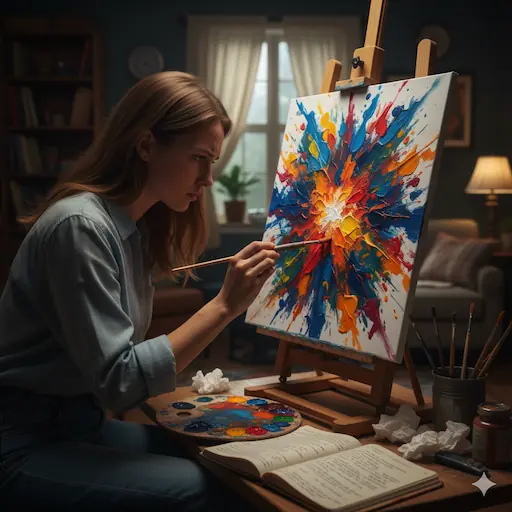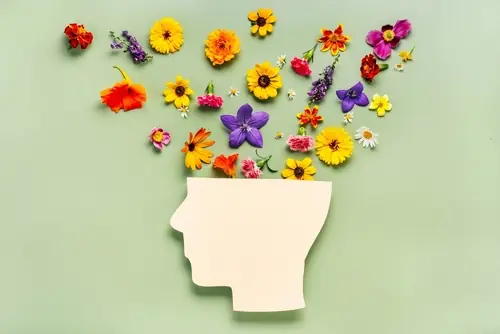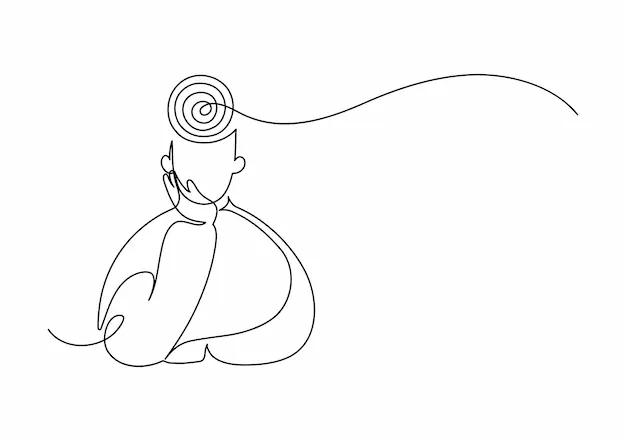
Art Therapy vs. Mindfulness Coloring: What’s the Difference?
While both art therapy and mindfulness coloring use creativity for mental well-being, they serve very different purposes. One is a clinical treatment, the other a relaxing hobby. Let's explore the differences and discover which is right for you.
Introduction: Two Paths to Mental Wellness
In the search for mental well-being, creative practices have emerged as powerful tools for healing and relaxation. Two popular methods, art therapy and mindfulness coloring, both use art to improve mood and reduce stress, but they operate in fundamentally different ways. One is a clinical discipline guided by a professional, while the other is an accessible, self-directed mindfulness exercise.
Understanding the distinction is key to choosing the right path for your needs. As interest in creative self-care grows, tools like Colorise are making personalized mindfulness coloring more accessible than ever, allowing anyone to create a moment of calm.

What is Art Therapy?
Art therapy is an established mental health profession that uses the creative process of art-making to improve and enhance the physical, mental, and emotional well-being of individuals of all ages. It is not simply "doing art to feel better"; it is a formal therapeutic practice facilitated by a master's-level, licensed art therapist.
In a session, the therapist guides the client through creating art to:
- Explore feelings and emotions: Art provides a non-verbal way to express complex thoughts that may be difficult to articulate.
- Reconcile emotional conflicts: The creative process can help individuals work through internal struggles.
- Manage behavior and addictions: Art-making can be a healthy coping mechanism and a way to understand triggers.
- Address trauma: It offers a safe outlet for processing traumatic memories and experiences.
The focus is on the process and the insights gained, not the artistic quality of the final product. Techniques can range from drawing and painting to sculpting and collage, all within a structured, safe, and confidential therapeutic relationship.
What is Mindfulness Coloring?
Mindfulness coloring is a form of self-guided meditation that uses the simple act of coloring to focus the mind and quiet internal chatter. Its goal is to promote relaxation and present-moment awareness by drawing your attention to a structured, repetitive activity.
Coloring helps achieve a state of mindfulness by:
- Reducing Stress and Anxiety: By focusing on choosing colors and filling in shapes, the brain's fear center (the amygdala) relaxes, lowering stress hormone levels.
- Improving Focus: The activity requires just enough concentration to anchor your attention, pulling you away from distracting thoughts about the past or future.
- Inducing a "Flow State": Many people experience a state of "flow" while coloring—a satisfying feeling of being completely absorbed in an enjoyable task where time seems to fade away.
Unlike art therapy, mindfulness coloring is highly accessible. It can be done anywhere with coloring books, printable sheets, or digital tools, and requires no special skills or guidance.
Key Differences Between Art Therapy and Mindfulness Coloring
While both practices are beneficial, they are not interchangeable. Confusing the two can lead to misconceptions about mental health treatment.
| Feature | Art Therapy | Mindfulness Coloring |
|---|---|---|
| Goal | To process trauma, resolve conflicts, and heal. | To relax, reduce stress, and practice mindfulness. |
| Guidance | Led by a licensed, trained art therapist. | Self-directed and can be done alone. |
| Setting | Clinical (hospital, private practice, school). | Non-clinical (home, office, anywhere). |
| Process | Explores deep psychological and emotional issues. | Focuses on the simple, repetitive act of coloring. |
| Outcome | Personal insight, emotional regulation, healing. | A sense of calm, improved focus, and a finished art piece. |
Important: Mindfulness coloring is a wonderful self-care tool, but it is not a substitute for therapy. If you are struggling with significant mental health challenges, seeking help from a qualified professional is essential.

The Benefits of Mindfulness Coloring
As a self-care practice, mindfulness coloring offers a wealth of benefits that are both immediate and long-lasting:
- Stress Relief: It's a proven way to calm a racing mind and lower physiological symptoms of stress.
- Improved Focus: Regular practice can enhance your ability to concentrate on other tasks in your daily life.
- Creative Freedom: It provides a low-stakes outlet for creativity without the pressure to be an "artist."
- Accessibility: It's an affordable and easy way to practice mindfulness without formal training.
- Personalization: With modern tools, you can create coloring pages that are deeply meaningful to you, enhancing the experience.
This is where a tool like Colorise shines. Instead of being limited to pre-made designs, you can create unique coloring pages tailored to your own interests and emotional needs.

How Colorise Enhances Mindfulness Coloring
Colorise elevates the practice of mindfulness coloring by making it deeply personal. Our AI coloring page generator allows you to create hyper-specific designs from your own ideas or photos, turning a simple hobby into a truly resonant experience.
With Colorise, you can:
- Turn Memories into Mindfulness: Upload a photo of a beloved pet, a favorite vacation spot, or a family member and transform it into a coloring page. Coloring a meaningful image can deepen your sense of connection and gratitude.
- Create Themed Pages: Feeling anxious? Generate a calming nature scene. Need a boost of joy? Create a page filled with your favorite flowers or animals. Describe exactly what you need, and the AI will bring it to life.
- Design Mandalas and Patterns: Generate intricate mandalas or repeating patterns, which are classic tools for focus and meditation.
By giving you complete creative control, Colorise ensures that every coloring session is a unique reflection of your inner world. It combines the therapeutic benefits of a personalized creative process with the simplicity and accessibility of mindfulness coloring.
Conclusion
Whether you're exploring mindfulness for the first time or seeking a new creative outlet, coloring offers a simple, powerful way to center yourself. While not a substitute for therapy, it's a valuable tool for daily well-being. Ready to start? Create a custom coloring page with Colorise and bring your own mindful moments to life.